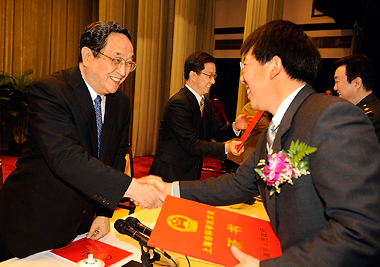|

|
|
Shanghai Party Secretary Yu Zhengsheng and Mayor Han Zheng award certificates to winners of the 2008 Shanghai Science and Technology Awards yesterday. |
Most people toss their shrimp and crab shells into the trash without a second thought after a meal. A group of Shanghai scientists has figured out a way to turn that waste matter into a gel that helps prevent problems in patients recovering from surgery.
Experts from the city's Changzheng Hospital have developed a process to extract and purify chitosan -- the basic structural element in the shells of crustaceans -- and turn it into a biomedical product that helps prevent the adhesion of organs following surgical procedures.
The invention was one of the top prize winners of the 2008 Shanghai Science and Technology Awards handed out yesterday.
One scientist and 299 projects received honors in natural sciences, technological inventions, science and technology progress and international cooperation.
The winning projects have applied for or won 1,593 domestic and overseas patents, 37 percent more than in the previous year.
Biological and pharmaceutical technology, information and automation technology, energy and environmental protection and new materials were the top winners, covering 70 percent of the awards.
In order to encourage local science and technology research and innovation, the government raised the financial award from 100,000 yuan (US$14,620) for first prize, 50,000 yuan for second prize and 20,000 yuan for third prize to 200,000 yuan, 100,000 yuan and 50,000 yuan this year.
"Though it is still not a big sum, the increasing award reflects our respect for talent, innovation and knowledge and a commitment to scientific development," said Yin Bangqi of the city's science and technology award management office.
Chitosan gel has been widely used in clinical treatments, and experts at Changzheng Hospital began to study its application as a blood-clotting agent for large wounds, said doctor Zhang Wei of Changzheng's orthopedics department and one of the researchers involved in the project.
The hospital team then found that the gel was useful in preventing neighboring internal organs and tissue from adhering to each other, a common problem in surgery and one that can cause serious physical discomfort.
"Animal experiments have been finished, and we are applying to do clinical tests," Zhang said yesterday.
The individual award went to John A. Buswell, a United Kingdom mushroom expert and a visiting professor at the Shanghai Academy of Agriculture Sciences. He won the international scientific cooperation award for his efforts in promoting local and domestic mushroom research to the international level.
(Shanghai Daily February 28, 2009)